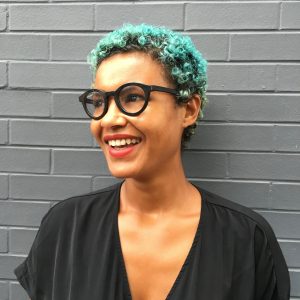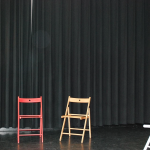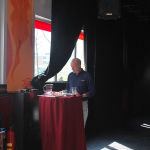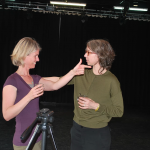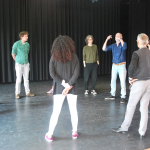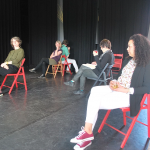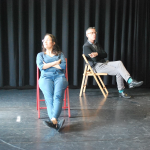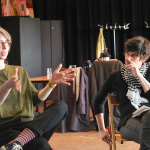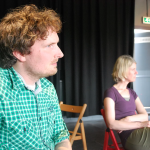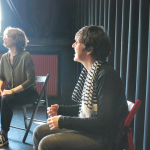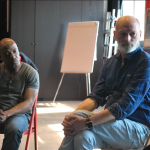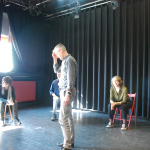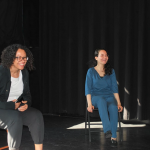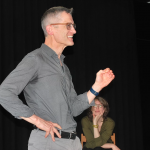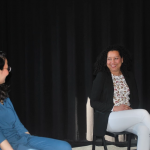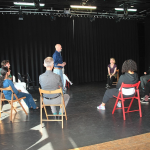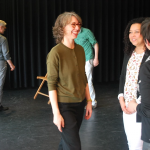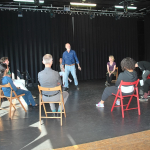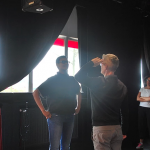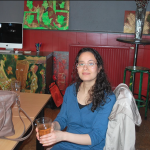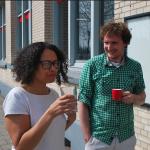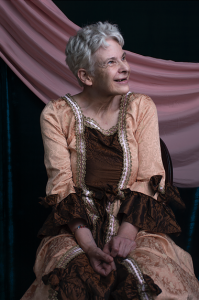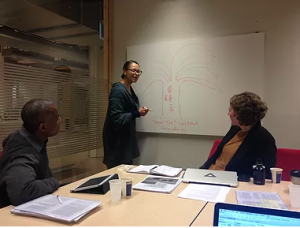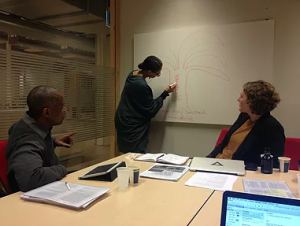Reader
Introduction
On Monday the 23rd of January the Dutch Prime Minister published in anticipation of the upcoming election, a public letter in all major dutch newspapers. In this letter aiming at the “silent majority” Rutte opens with the sentence, that “there is something wrong with our land” and asks citizen’s to “act normal” and protect Dutch values or to otherwise “leave”. The Netherlands is a very cool and prosperous country, he states, which does not tolerate anti-social behavior. Amongst which he lists, acts such as spitting on conductors, harassing Gay men, lifting up Women’s skirts and calling “ordinary Dutch people racist”. (Rutte 2017)
This letter can neither be read as detached from the right wing, or let’s simply call it (global) fascist populist movement around Geert Wilders, nor from the rising Islamic- and xenophobia in this country. Whilst his call for non-violent and respectful behavior may appear as a reasonable claim, the question remains “what is normal” and “who” is he really talking about?
The vilification of young men of Turkish and Moroccan descent in the Dutch media, is picked upon in this letter and hence directly connected to the fear of “foreigners” and Islamicisation or “Radicalization” by the 6% of Muslims (Institute for Multicultural Affairs 2010) living in The Netherlands. Rutte eloquently manages to make these statements through a passive aggressive tone, by not-naming Turkish and Moroccan communities, who he —“collectively”— wants to defend the Dutch values against. This defence is highly sexist as the main perpetrators of aggression against the Dutch value system are constantly named as CIS Muslim men, which points towards a hetero-patriarchal conflict. By this, I mean that the duality with which Muslim men are the aggressors from whom Muslim, as well as Christian Women as well as white Gay men, have to be saved from is a common European narrative. (Dietze 2009) To “act normal” and protect Dutch values conclusively includes being openly xenophobic, sexist, populist and ignorant of the long history of Dutch racism and colonialism. But to write this would also offend the Prime Ministers view that “ordinary Dutch people are racist”, which is another aspect of this letter, that remains questionable. It seems that racists are exceptional individuals and the rest are innocent. The misunder-standing here of racism as simply a curse word is dismissive of the systemic racist structures on which the Dutch (global) ideological system is based and moreover that racism is not connected to privileges and prejudices from one group against another. My emphasis here lies on privilege as it is a defining factor whether a group can maintain and structurally create forms of exclusion and exploitation. Because a White person, who is affected by homophobia, classism or ageism does not necessarily lose their racial privilege when it comes to finding work, housing or access to healthcare. Their actions, however, can have a massive effect on the lives of people of color.
The Dutch idea of Norms and Values (
Normen and Waarden), which is deeply rooted in the Dutch Cultural Archive (Wekker 2016, said 1993) are held high, but in times in which being right wing, xenophobic and racist has become the new norm this letter is not only alarming but a call to not remain silent and take action.
At the beginning of the academic year, September 2016 the HR published a short essay called
Samen Leven in de Samenleving co-authored by Ron Bormans and Izaak Dekker. In this text Bormans and Dekker try to establish the University of Applied Sciences as a “Village” within a City as a kind of intermediary space with rules, or in other words with Norms and Values. The introduction starts with a nostalgic glance to the past when going to primary school was marked by small scalenes and “many dialects”. Which creates a homogenised picture of who went to this school, other languages are not part of this reminiscing narrative, which hence already emphasizes (again without naming) the fact that the Dutch demography is not homo-genically White Dutch anymore. It cannot go unnoticed, that Dekker and Bormans chose amongst the first three “Thinkers“ to uncritically cite the politician Pim Fortuyn. A person, whose hate speeches against Islam and Muslims had a divisive dominating presence in the Dutch discourse in the late 1990’s early 2000’s. The sentiment, which he expressed in his book
Tegen de islamisering van onze cultuur, despite distancing himself from Geert Wilders, is echoed in the contemporary populist movement. Fortuyn stands out as one of the main resources for the explorations on diversity and values throughout the publication, with his main argument, which is embedded in Judeo-Christian belief system, that Dutch culture is missing a common value system to strengthen the society and hold it together. (Bormans and Dekker 2016, 25) This post-modern dystopia of the fragmented “superdiverse” society is a recurring theme in the essay. The “fragmentation and variety” they suggest in this publication leads to violence, which is why it is important to have a core identity and value system as an institution that holds people together, borrowing these conclusions from the clinical Psychologist Paul Verhaeghe (Bormans and Dekker 2016, 27). The notion of violence is not further elaborated at this point, but given that the College van Bestuur sent an email to all Hogeschool employees in 2014 warning against “radicalization in the classroom” the notion of violence can hence also be read as a synonym for the development of the radicalization of students with Muslim beliefs. I will not go further into detail how the term radicalization has become synonymous with Islam, but want to point out that i.e. the use of Pim Fortuyn is within itself a radical positioning in a context that claims to be intolerant towards “any kind of radicalization” and discrimination on the basis of i.e. religious beliefs.
Whilst rejecting a centralized model of strict government within the school, the core question that the authors ask is how to create plurality within an institution or as a “superdiverse” and open institution on the basis of Norms (Bormans and Dekker 2016, 30–31). Superdiversity here, as I have established in the publication,
Stake in the Unknown is a way of talking about “Diversity” without addressing the core issues of White hegemony. In other words, the problem is that Superdiversity tries to address the multiplicity and complexity of Diversity,which is composed of a plethora of different socio-political and historical shifts, that are manifested in the hybridity of our various identities, without a critique of White Privilege and Hegemony. So the core of my critique is that, a thorough engagement with the epistemological and ontological violence that are constantly reproduced through Eurocentric Hegemony remains unquestioned, which is why Super-diversity is another term to cloak the power structures that create systemic exclusion.
“Individual freedom, rationality and autonomy” are at the core of the liberal value system, which Bormans and Dekker propose (Bormans and Dekker 2016, 43); values that find no further elaboration nor critical discussion. At the same time, these core values are equated with a “modern society”, because in Dekker and Bormans view these values are under threat by Muslim Societies or Communities, that are
“struggling with Modernity” (Bormans and Dekker 2016, 47–48). It is difficult to read such explorations without seeing a pattern being reproduced, which can also be a found in Rutte’s open letter. Although, Bormans and Dekker are more explicit when it comes to their view on Islam, which they secure by quoting a theorist, who belongs to the Muslim community itself. I am emphasizing the strategic use of Muslim theorists in this publication because, in the same way in which Black people who are pro Zwarte Piet are utilized in public conversations in order to justify the legitimacy of the racist tradition, Bormans and Dekker instrumentalize Muslim theorists in the same way.
Despite the fact that Bormans and Dekker only implicitly ask students to act within the confines of the school’s value system, these actions are within the idea of Norms and Normativity and can equally be considered as “normal” actions. Which embeds the essay within a national discourse that makes populist ideas accepted as the Norm.
The Struggle with Modernity
It may come as a surprise that I start the introduction to this publication with a discussion of the internal as well as external conversations about the rise of Xenophobia and Islamophobia in this country. But as I have stated before, this is not a time to remain silent. The struggle with Modernity and here I am referring to the enlightenment project from which the liberal value system referred to by Bormans and Dekker, is one, which has been part of the post-colonial critique for decades. I don’t have to mention that apart from the instrumentalization of Muslim voices in the publication any other epistemologies deriving from marginalized voices are missing, but I will return to this point.
The post-colonial theorist Nikita Dhawan poignantly emphasizes my critique in her introduction of her book
Decolonizing enlightenment, in which she writes
“Emancipatory movements for suffrage, abolition of slavery and civil liberties can all be traced back to the Enlightenment, even as it continues to inspire contemporary social and political movements. The Enlightenment idea of individual rights and dignity, it is believed, enables the exercise of political agency and expands individual freedom. However, as has been pointed out by both scholars of Postcolonial Studies as well as Holocaust Studies, Enlightenment’s promise of attaining freedom through the exercise of reason has ironically resulted in domination by reason itself. Along with progress and emancipation, it has brought colonialism, slavery, genocide, and crimes against humanity.” (Dhawan 2014, 9)
So the question is, if a truly inclusive institution can uncritically build on the legacy of an epistemological project (which is always in the making) which in and of itself is highly exclusionary or if a decolonial approach should be in place? In the introduction to the essay Borman states that he saw the “liberation of the Maagdenhuis” at the University Amsterdam as “one sided”. The liberation that was initiated by students of color, who want their learning environment reformed into a decolonial institution is a demand, which derives from the same critique as I have just presented. This means that the epistemic violence that is reproduced through the methods and content within the school has been addressed and criticized. A critique which is from the beginning in the essay by Borman dismissed.
The conversation that we have to have is one that goes to the core of the critique of prevailing colonial paradigms, to the heart of our individual historically formed identities and their relationships to each other, as well as aims to destroy White Hegemony.
WdKA makes a Difference was from the outset a project that was interested in looking into the ways in which White Hegemony has prevailed within the Willem de Kooning Academy. Although the language when I started this project was more centered around the discourse of in- and exclusion (Adusei-Poku 2015, 23–24), the project has shifted due to its design into a stronger investigation into Difference and the role Difference plays in the classroom as well as the intake of students. The distribution of critical knowledge from postcolonial, gender-queer theory, critical race as well as Black Studies within the WdKA to push the boundaries of normativity and initiate decolonial thinking has been the main angle of this project. Although widely unnoticed —because not under the banner WdKA makes a Difference— this project has influenced the art-school in a sustainable way, through the development of the
Minor+ Visual Culture, an Elective (
Keuzevak)
Make a Difference, Thematic Projects in the MFA program, multiple guest lectures in various seminars, an exhibition collaboration with Witte de With as well as Film Screenings and talks.
The team which consisted of various numbers ranging from 1-7, depending on already scarce resources, engaged in monthly readings on subjects such as Inclusive Pedagogy, Critical Whiteness and Decolonial Art Education.
The artist
Patricia Kaersehout held a performative workshop in 2015 and we arranged a Theater of the Oppressed workshop at
Formaat, Workplace for Participative Theater in Rotterdam in 2016, which deepened and formed the critical understanding of this group. Our conversations, learning from each other and sharing experiences have informed this publication and its themes, but it has also informed my understanding that social change is relational, by which I mean that without this team, who have been willing to engage with uncomfortable questions this project would not have been realized.
I would therefore like to thank everybody who has been involved in this project: Eva Visser, Liane van der Linden, Teana Boston-Mammah, Rudi Enny, Jan van Heemst, Reinaart Vanhoe, Marleen van Aarendonk, Remko van de Pluijm and Mark Mulder as well as the many students and colleagues who we have been in conversation with. But a project like this, which received no external funding would not have been possible without the support of it’s home base the Research Center Creating 010. It would be a misunderstanding to consider our work as finished and I would, therefore, like to end with a reference to Angela Davis: “Freedom is a constant struggle”. •
Download
Introduction by NanaAduseiPoku.pdf or download
WdKa Makes A Difference Reader 2017
